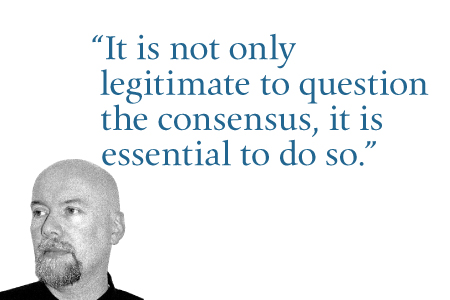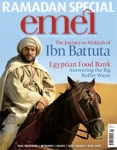
Challenging the Consensus
Issue 71 August 2010
Ijma - A challenging concept for the re-contextualisation of Islam
One of the greatest challenges for European Muslims is the concept of ijma or consensus. How often have we heard our scholars dismiss debate on an issue because ‘there is ijma on this’, meaning scholars have an already agreed opinion on this topic which leaves no room for further discussions? But is this really a valid response?
Ijma as a concept was developed in the early days of the formation of sunni jurisprudence. Where the shi’a relied upon the infallibility of the Imams, the sunnis needed an alternative basis for legal authority. In this context, the hadith of the Prophet which states that, “My Community shall not agree upon misguidance,” (Ibn Majah) was used to give power to the scholarly classes (ulema) by making them the authority that determined the lawful, the unlawful and the established norms. It was also reassuring for the community in legitimising the historical fact that ultimately Abu Bakr was agreed upon as the first Caliph following the death of the Prophet.
Ijma therefore became a mainstay of the community and thus any challenge to it as a concept was, and still is, greeted with hostility. Nevertheless, there are two key points that must be addressed. The first is the fact that there has never been ijma on the basis for and limits of ijma itself. Ijma has, in many cases, come to be used quite loosely to indicate a majority view, and it is unclear of whom consensus is being claimed – the Sahaba, the scholars of the Sahaba, the founding scholars of sunni jurisprudence or the contemporary scholarly community? The second point is the question of when ijma can be legitimately challenged, since it has been successfully challenged on many occasions throughout history. Most, if not all of our ‘great’ ulema are remembered precisely because they did presume to challenge the consensus. Ibn Al-Jawzi(d.1201CE), for instance, challenged the ijma of the Hanbali scholars on their understanding and interpretation of the attributes of God. He was persecuted for this, yet his view came to dominate and generate a new ijma.
Majority views exist in the scholarly community on many topics. Some are fundamental concepts of belief but many are interpretations of shari’ah that are based on urf (custom) or maslaha (public interest). In these areas I would suggest that it is not only legitimate to question the consensus, it is essential to do so, as when we change the social, historical or economic context of an opinion it may become invalid. This challenging of the ijma must of course be done correctly; both methodologically and in terms of courtesy, both as students and teachers. As students we need to pose these crucial questions with both humility and clarity. We may be aware of a new cultural context in a way that our teachers are not, but they may be aware of the legal basis for established opinions in ways we are ignorant of. Our scholars also need to adapt and to accept the questioning of rules and principles to a degree that their teachers may not have been able to conceive of. We must move away from the crude position of always defending the status quo; this does not strengthen the shari’ah and it does not unify the community, rather it causes the younger generation to lose faith in their leaders.
The position I believe we must move towards is that of accepting the legitimacy of even the most challenging questions and being prepared to re-examine the interpretation of the shari’ah in each case. Undoubtedly, there will be many instances where the traditional view will be upheld but even here the process will be valuable as it will fully legitimise the rulings for our current context and reassure the community that Islam remains the living tradition of the Prophet Muhammad. Far from undermining the authority of the scholars of old we will be resurrecting the principles of reform they stood for, whether we are talking of the founding scholars of the four schools, the challenging voices such as Ibn Taymyyah and Al-Shatibi or the more contemporary figures such as Muhammad Qasim Nanautawi and Ashraf Ali Thanwi.
In his last will and testament, the late Khurram Murad stated, “We, as Muslims, have but one option: to strive to change the world according to the model given to mankind by the Prophet Muhammad.” This model was not a static one based upon a utopian society but a set of principles that guide us to understand the best way for us in any given context. We need to make shari’ah our guide not a barrier to fulfilling this obligation.
Dawud Bone is the Stone Ashdown Director of the Centre for the Study of Muslim-Jewish Relations at the Woolf Institute.
Bookmark this |
|
Add to DIGG |
|
Add to del.icio.us |
|
Stumble this |
|
Share on Facebook |
|
Share this |
|
Send to a Friend |
|
Link to this |
|
Printer Friendly |
|
Print in plain text |
|


Comments
0 Comments